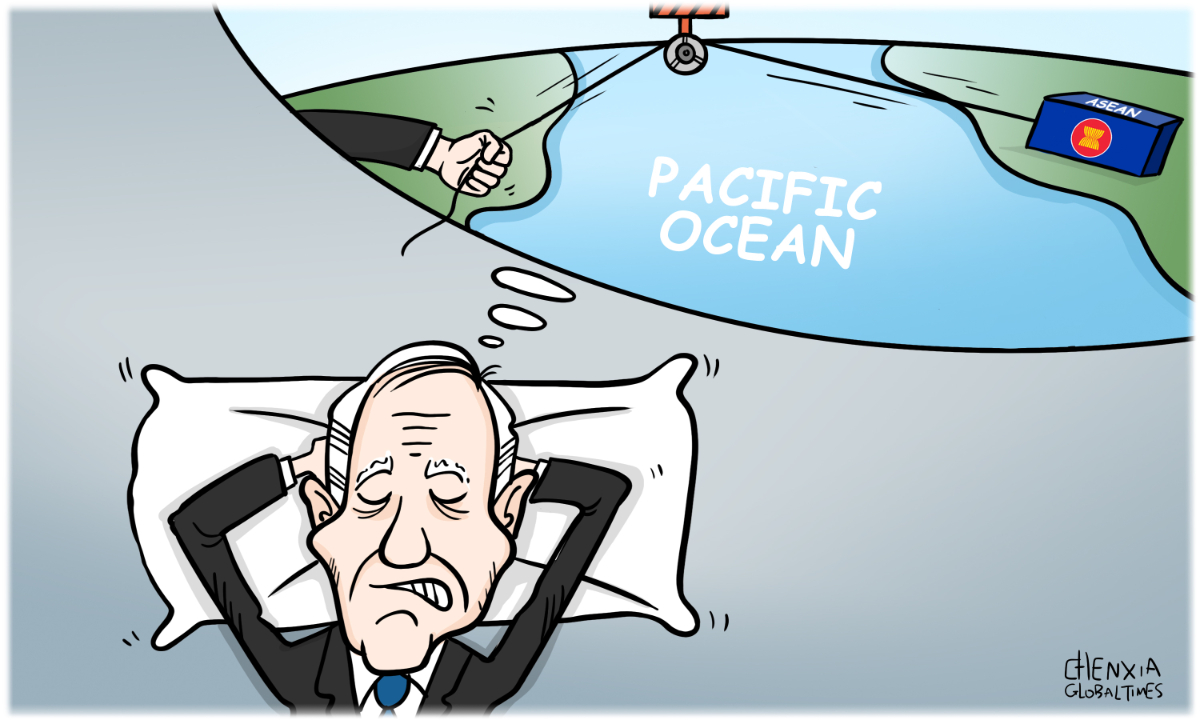
Illustration: Chen Xia/Global Times
Prodding the 10-member ASEAN countries to side with Washington, the US President Joe Biden made a couple of vague promises during his weekend summit meeting with the leaders from Southeast Asia. The Biden administration pledged $150 million in aid to ASEAN to assist local infrastructure, pandemic preparedness, green growth and other projects, and it also announced the US-choreographed plan named Indo-Pacific Economic Framework (IPEF).
Senior officials from the White House told reporters bluntly that the US convened the summit in order to short-circuit China's growing influence in the region.
But just as the majority of ASEAN nations have, persistently, refused to condemn Russia and President Vladimir Putin - something the US government has been eagerly asking for ever since the Ukraine crisis broke out on February 24, Asian countries are highly unlikely to jump on the US bandwagon of playing another geopolitical zero sum game targeting China.
ASEAN leaders know perfectly well the stark difference of global and regional governance between China and the US. China is a close neighbor, with a mammoth market of 1.4-billion increasingly affluent consumers, and Chinese leadership has been promoting win-win economic partnership and common prosperity agenda through closer regional integration initiatives like the RCEP and BRI - the world's largest free trade agreement, and the most important and largest cooperative infrastructure scheme, respectively.
In sharp contrast, what the US government has been pursuing is forming political and military alliances one after another to shore up and prolong its predominance and hegemony throughout the world. Now, Europe is descending into a big crisis, just because the US-led NATO, the world's largest and most aggressive military bloc, has never stopped its eastward expansion till Moscow deemed its national security "red line" was breached, forcing President Putin to launch the "special military operation" to prevent Ukraine from becoming another NATO member at its doorstep.
After Biden took the White House, his administration has picked up Obama's pivot-to-Asia strategy and started to form political and military groupings in Asia, typically the US-Japan-Australia-India quadrilateral security clique called the QUAD, and AUKUS, in which the US and Britain are set to build advanced nuclear submarines for Australia. Both groupings are reportedly to contain China's development, but like NATO, will surely splinter Asia and make Asia an increasingly dangerous place - like Europe.
ASEAN leaders have got to know the true intentions of the Biden administration, because it is crystal clear that AUKUS and the QUAD will never be in the interest of ASEAN and the region at large, for they are two strong destabilizing forces for Asia-Pacific. Politicians in Washington are loath to take seriously economists' prediction that 21st century will be "Asian Century," and the US will do all in its capacity to thwart Asia's rise.
Kurt Campbell, Asia coordinator for the US National Security Council, recently claimed that building deeper ASEAN ties would be a major Biden priority for 2022, a move the mainstream US media outlets deciphered as a "belated recognition of ASEAN as a critical battleground for China-US competition."
The former Trump administration and the current Biden administration are both protectionist governments, which don't care about the interests of emerging market economies, such as ASEAN, but always putting America's benefits above all others. Trump ditched the Trans-Pacific Partnership (TPP) in 2016. And, Biden and his national security advisor Jake Sullivan are by all accounts set against re-entering the Comprehensive and Progressive Agreement for Trans-Pacific Partnership (CPTPP).
Just like the two administrations have imposed punitive tariffs on Chinese goods and restricted US technology supplies to Chinese enterprises, Both Trump and Biden, to protect American workers and manufacturers, do not want to give low- or zero-tariff treatment to ASEAN countries. But to make itself look good, the Biden administration hastened to draft the IPEF (Indo-Pacific Economic Framework) - a patchwork that allow ASEAN and other regional countries to sign up for "different modules covering fair trade, supply chain resilience, infrastructure and decarbonization, and tax and anti-corruption."
But, IPEF is never a competitor against RCEP and BRI. Packaging a new framework cannot disguise the way the US is entrenched in egoism and economic protectionism. In the foreseeable future, Washington will continue to refuse to negotiate that kind of significant market-opening free trade deals and inclusive infrastructure initiatives that ASEAN nations want most.
Compared to the US government' embracing a Cold War mentality, playing group politics and engaging in bloc confrontation, China has led global efforts to build a balanced, effective and sustainable global and regional security architecture. In terms of economic partnership, China will continue to put forward initiatives like BRI and RCEP to create more win-win opportunities and drive ASEAN's growth.
Washington politicians' sinister bid to build a wedge between China and ASEAN will fail. At the special summit last year to commemorate the 30th anniversary of China-ASEAN Dialogue Relations, China's top leadership emphasized that China will continue to accord high priority to ASEAN countries, unswervingly support ASEAN unity and community building, and always support ASEAN centrality in the regional architecture and ASEAN playing a bigger role in regional and global affairs.
To sum up, the Biden administration wants to push Southeast Asia at the heart of its so-called Indo-Pacific strategy to contain China. But ASEAN countries are never chess pieces like Ukraine, being used and played by Washington. Asian countries and government leaders will treasure regional stability and prosperity just as they love their eyes. With China acting as a strong regional engine, the 680-million-population ASEAN is destined to double and triple its current $3.3 trillion economy.
The author is an editor with the Global Times. bizopinion@globaltimes.com.cn




